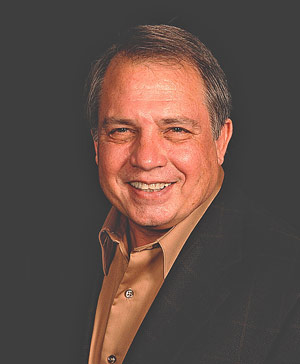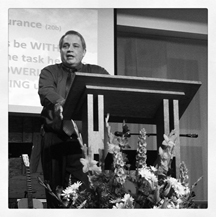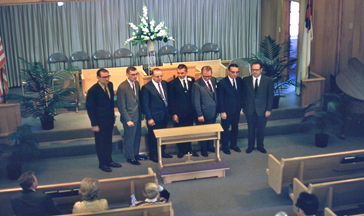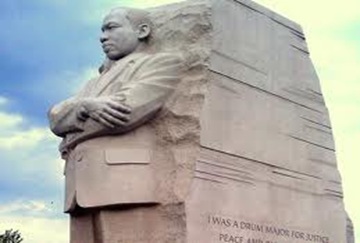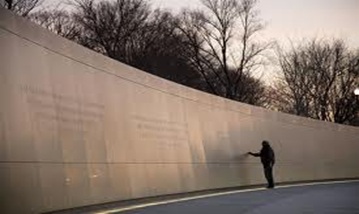“A Piece of My Mind”
December 2013 Newsletter from Donald Shoemaker
Advancing Christian Faith and Values, Defending Religious Liberty for All, Supporting Civility and the Common Good through Preaching, Teaching, Writing, Activism and Reasoned Conversations
A New Year
This is the beginning of a brand new year.
God has given us this year to use as we will.
We can waste it or use it for good.
What we do with this year is very important
because we will have exchanged a year of our lives for it.
When next year comes this year will be gone forever,
leaving something in its place we have traded for it.
We should want it to be gain, not loss; good, not evil; success, not failure,
in order that we will not forget the price we paid for it.
(author unknown)
“Prophets are Good for Business”
(Applying Biblical Principles to Work Situations)
Eager to Serve
“Serve wholeheartedly, as if you were serving the Lord, not men, because you know that the Lord will reward everyone for whatever good he does” – Ephesians 6:7-8 NIV *

John Luther, member of Grace Community Church of Seal Beach, California, is a man of encouragement and always eager to serve. John doesn’t compartmentalize his Christianity. He takes these qualities to work with him as well. He is a pilot for Delta Airlines.
Before a recent flight, as he walked down the aisle from the cockpit to exit the plane for the visual inspection, he offered to hang up a passenger’s coat.
Turns out this passenger was one of Delta’s vice presidents and, at that time, he thanked John for serving others and representing the company so well.
Soon thereafter, the VP wrote a letter to all the heads of Delta including the CEO, to say that John was the perfect example of what all Delta pilots should be like to their customers.
Keep up the great work and example, John. Many of us need to take a fresh look at our attitudes and how we live out our faith in the workplace.
* This text falls within “household codes” (Ephesians 5:22-6:9 and Colossians 3:18-4:1)
and addresses the duty of household servants. It can be applied to employment situations only with caution and with an understanding of the differences between master-servant and employer-employee relationships (for example, the latter may be governed by contracts, policies and employment laws). Though the situations differ, the qualities of heart should be the same. No contract, policy or law can legislate these.
Religious Liberty Vigilance – Religious Liberty and Contraception under “Obamacare”

“Congress shall make no law respecting an establishment of religion, or prohibiting the free exercise thereof…”
– 1st Amendment (Our “First Freedom” in the Bill of Rights)
– 1st Amendment (Our “First Freedom” in the Bill of Rights)
“Those who expect to reap the blessings of freedom must…undergo the fatigue of supporting it.” – Thomas Paine”
A couple’s personal, private decisions on contraception should be just that—personal and private.
If they belong to a religious community, they need to consider that religion’s teachings, at least if they seriously claim to be part of that faith community.
This couple would likely not want the government to have any directive in this matter. And in decades past most would not have expected the government (taxpayers) to pay for their contraception decision, or force others like religious colleges to pay for what they decide.
Fast-forward to “Obamacare” and contraception is now being treated as if it is a sacrament, a Secular Eucharist dispensed freely by government grace.
The administration’s original highhandedness (the statement by Health and Human Services Secretary Kathleen Sebelius on January 20, 2012) that would have run roughshod over religious scruples has morphed a lot, but there are still issues. At one end, the government would exempt “houses of worship”—a slender concession. At the other end, debates and court decisions mushroom over the mandate to secular businesses owned by people with religion-based objections to contraception—people trying to lead their businesses in the light of their values. In the middle are religion-based institutions other than churches—schools, hospitals, social agencies, etc.
That these institutions, absent a compelling state interest, should be able to implement policies reflecting their core moral values is, to me, a clear right. Enter Americans United for Separation of Church and State. One would think by its title this group would not want the government to boss the affairs of religious organizations, thereby breaching “the wall of separation”. But no, AU is seeking to intervene in behalf of students at the University of Notre Dame to ensure that their health plan gives access to contraceptives.
AU asserts, “Even if the University’s religious exercise were substantially burdened by the challenged regulations, there is a compelling interest for the imposition of that burden, namely, providing the affected women with access to contraception and the consequent control over their sexual lives, bodily integrity, and reproductive capacity” [emphases mine].
The key words here are “substantially burdened” and “compelling interest for the imposition of that burden.” This argument would override religious protection provided by the Religious Freedom Restoration Act (1993).
I find it interesting and frustrating that AU argued quite differently in 2002 when it opposed Catholic Charities (Catholic Charities of Sacramento vs. Superior Court) in a similar case about insurance coverage of contraceptives. AU argued then that the 1999 California statute requiring contraceptive coverage “should not be deemed to impose a ‘substantial burden’ on the exercise of religion because CC can opt to pay a stipend for contraceptive coverage rather than purchasing the coverage itself and can still issue statements and disclaimers against the use of contraception” [emphasis mine]. CC could also comply with the law by simply not offering prescription drug coverage at all, the California Supreme Court said! Not a good thought!
I’ll let legal experts debate Obamacare’s contraception mandate. I’ll continue to pray and work for a libertarian understanding of religious freedom.
I conclude here with, first, the observation that AU’s defense of separation of church and state is very often a veneer for the pursuit of its own liberal agenda. Second, AU has trotted out a letter signed by 1000 clergy that demands equal access to contraception. At the end of its blog labeling these signers “conscientious clergy” AU says, “This is not a theocracy, no matter what the Religious Right and its allies say.” Come now! It is not theocratic to let a religious institution define and live out its own creed and mission.
Bible Insight: Different Pathways for Each of Us
If a man does not keep pace with his companions,
perhaps it is because he hears a different drummer.
Let him step to the music he hears,
however measured or far away.
– Henry David Thoreau
“Jesus said [to Peter], ‘…when you were younger you dressed yourself and went where you wanted; but when you are old you will stretch out your hands, and someone else will dress you and lead you where you do not want to go.’ Jesus said this to indicate the kind of death by which Peter would glorify God…
“Peter turned and saw that the disciple whom Jesus loved was following them… When Peter saw him, he asked, ‘Lord, what about him?’
Jesus answered, ‘If I want him to remain alive until I return, what is that to you? You must follow me.'” (John 21:18-22 NIV)
I’ve thought a lot about these verse since hearing a sermon at church on the 21st chapter of John’s Gospel.
Jesus has many different pathways for his followers to travel. He had one for Peter. He had a different one for John. The path Jesus had for John was for Peter, well, none of his business. His business would be his own pathway, which would be arduous enough. If we focus as we should on the challenges and opportunities of our own pathway, we won’t have time or desire to meddle in and judge the pathways of others.
Many different factors will affect the path we trod. Our background and family upbringing. A tragedy, a serious illness or untimely death may fully refocus us. Our personalities—are we more introvert or extrovert?
Some of us grew up in the Christian faith and our “conversion” is really a personal confirmation of what we have accepted all along. Others may have a dramatic conversion that initiates a significant redirecting of life. Don’t impose your “born again experience” on others.
Some of us progress spiritually through the regular, weekly worship and instruction of the church, including its sacramental life. While this option should never be forsaken (I’m adamant about that!), others of us may have a more personally nurtured journey or progress through more informal ways. Today’s trend seems to be away from big-church stuff to smaller venues. Some (me) prefer robust worship; others like the contemplative. Can’t the Spirit of God fill both? Isn’t either subject to error or abuse?
My mother’s deep walk with God came from (or led to—I’m not sure which) listening to radio preachers and old gospel music that would now drive me nuts. She was subjective and somewhat mystical in her faith; I was academic and rationalist in mine. Ne’er the twain shall meet—at least not in our family—and I could not find my pathway under her tutelage. She rose with the rooster to have her “daily quiet time” while I’ve taken solace that even on the Day of Pentecost the Holy Spirit waited till 9:00 a.m.
Don’t impose your notion of “being discipled” on someone else. Maybe that person gets his “being discipled” primarily from corporate worship, hearing the Word and receiving the Eucharist and isn’t into the “one on one” track.
Spiritual gifts? Your spiritual gift probably isn’t mine, and the gift(s) we have will mold our convictions on what ministry priorities ought to be. We’ll have healthy debates over the church budget. I think that if the church nurtures a wide variety of spiritual gifts and encourages their ministry, its priorities will balance out to what they ought to be.
What’s there to say about all this? Don’t judge or seek to supervise your brother and sister as they walk their own pilgrim pathways. “What is that to you? You follow me” – Jesus.
Don’s Upcoming Ministries
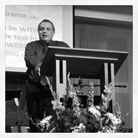
Friday, January 10—Speak on the Experiences and Lessons of the 2011 Salon Meritage Massacre in Seal Beach. Sponsored by “Area C Chaplains Partnership” (serving several San Fernando and San Gabriel Valley agencies). Meeting is at the Burbank Police Department.

Good News from Grace
- January 5 – We recommit ourselves to God in a meaningful “walk up” Communion Service as we begin the New Year.
- 12 weeks of excellent Leadership Training commences on January 12.
Message of the Month—Shopping for Toys?
“Let Boys and Girls Be Boys and Girls”
Is the resocialization of your son and daughter coming to your nearby toy store? Maybe so, if pressure groups have their way. One such group is “Let Toys Be Toys”. It wants to remove any hint of “gender bias” in the way toys are sold—a form of sexism that limits children’s interests. (How about a campaign to equalize shelf space for men’s and women’s toiletries at stores?)
Here is a sign of their success (news item):
Take a stroll through a local Toys “R” Us and you’ll see aisles clearly drawn with pink and blue. The boys’ toys drill and jab, girls’ toys primp and clean. It feels familiar now, but in a decade, that division may have gone the way of the restaurant smoking section.
In a recent announcement that has rippled across the Atlantic, Toys “R” Us in the United Kingdom pledged to stop organizing their merchandise by gender and to designate new standards for in-store signage. That means dramatically more images of boys and girls enjoying the same toy.
Now, if this were a marketing decision based on their research of customer preferences, I’d have no problem. But this appears to be pressure-driven.
If “Focus on the Family” or the Religious Right were campaigning for girls aisles and boys aisles, many would yell with some justification that this is imposing your own morality and worldview on others. Yes, and so it is with “Let Toys Be Toys.”
“So God created man in his own image…male and female he created them.”
(Genesis 1:27)
“At the beginning of creation God made them male and female.” – Jesus
(Mark 10:6)
The Patriarchs of Israel are Abraham, Isaac and Jacob. Jacob and Esau were twin brothers, born to Isaac and Rebekah. At that point all things in common ceased. Esau was born looking like a red hairy garment. He grew up to be a rough man, a skilled hunter who enjoyed being out on the land. Jacob was a smooth-skinned guy, content to quietly stay home. Esau was daddy’s boy; Jacob was mama’s boy. Read of this dysfunctional family in Genesis 25-27.
Put Esau and Jacob as children together in a room with some toys and I doubt you’d see them playing with the same toys.
So I don’t want to be too dogmatic when it comes to “boy’s things” and “girl’s things.” Still, the creation of humanity as male and female and the affirmation of this distinction by Jesus point to a “givenness”, a “groundedness” if you please, in what we are as either male or female. Male and female are equal but they are not the same. “Maleness” and “femaleness” are linked to what we are physically; they don’t float above our physical being. They are not primarily social constructs. Boys and girls will still play with toys traditionally theirs.
With California schools preparing to accommodate students whose “gender identity” differs from the gifts of nature, the issue is much bigger than toy aisles.
Recommended Reading:
- The War Against Boys: How Misguided Feminism is Harming Our Young Men by Christina Hoff Sommers (Simon & Schuster, 2000). See chapter 3, “Guys and Dolls”, on how some would reconstruct gender.
- Evangelical Catholicism by George Weigel (Basic Books, 2013). Modern “Gnosticism” teaches the “utter plasticity of the human condition.” Nothing is given in men and women; all is malleable (p. 44).



